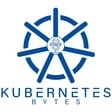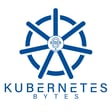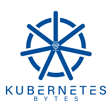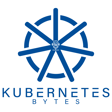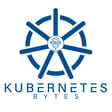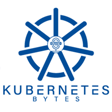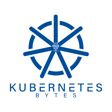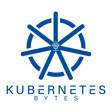Introduction to Kubernetes Bites
00:00:03
Speaker
You are listening to Kubernetes Bites, a podcast bringing you the latest from the world of cloud native data management.
Meet the Hosts & Podcast Focus
00:00:09
Speaker
My name is Ryan Walner and I'm joined by Bob and Shaw coming to you from Boston, Massachusetts. We'll be sharing our thoughts on recent cloud native news and talking to industry experts about their experiences and challenges managing the wealth of data in today's cloud native ecosystem.
Broadcast Details & Greetings
00:00:28
Speaker
Good morning, good afternoon, and good evening wherever you are. We're coming to you from Boston, Massachusetts. Today is November 10th, 2021. I hope everyone is doing well and staying safe. Let's dive into it.
Weekend Stories: Bob's Diwali
00:00:44
Speaker
Bobbin, how have you been? What have you been up to?
00:00:47
Speaker
I've been great. I think I gained a couple of pounds over the weekend. So some background, like it was Diwali, the Indian festival and I had a few friends come over and like we had some great Indian food. We played a lot of board games and it was a fun weekend. So I'm definitely like motivated now to go for a run, maybe after we are done recording this.
00:01:11
Speaker
Nice, nice. Something I learned about you recently was your talent in Bollywood songs. Any of that over the week? Not really. We played a couple of interesting board games. One was called Deception, where you have to basically solve murder together and you get a role as a police investigator or a CSI. That was one. And then another one was Secret Hitler, where you are either a liberal or a fascist or even a Hitler.
00:01:40
Speaker
And we basically have to make sure your side wins. So those were fun games. Those sound common. I'm into like Una when I play card games. Those sound really fun. I once played a board game called like pandemic or something on those lines. That was pretty fun. But sometimes I'm like board games are about not using my brain so much, but it sounds like you'd really like escape rooms and stuff. Maybe we just do one together soon.
00:02:06
Speaker
How about you? Most of the weekend, I was studying for something I was doing in my personal life, but also trying to enjoy downtime. We had friends over for dinner, a friend of ours and their daughter and son.
00:02:24
Speaker
came over for dinner. They haven't actually been over in our house for about two years. It's because of COVID. It was so nice to just welcome them in our house and do dinner, but also just enjoying the downtime because I am having a lot of family up this weekend. I think a total of four dogs, five adults, and seven kids. Our house cannot support that, so they're just going to be everywhere.
00:02:51
Speaker
But I am also looking forward to that. It's a good feeling to have your family around, so nice.
Guest Introduction: Michael Cade
00:02:59
Speaker
Before we dive into the news, we are going to have Michael Cade on the show. For those of you who are not familiar with who Michael Cade is, he is a community-first technologist. He works for Kasten by Veeam. You may know Kasten. If you didn't know, they were acquired by Veeam last year.
00:03:20
Speaker
And Michael is based in the UK and he's been in the industry for over 16 years with experience and a key focus on technologies in the cloud native automation and data management space. So we're really excited to have Michael on and talk data protection and disaster recovery with him in a short moment.
00:03:43
Speaker
But before we get into that, let's talk about what's going on in the cloud native storage space. Bhavan, why don't you kick it off? Yeah. Last week was Microsoft Ignite. Again, it was a virtual event, but they did have some good announcements, a couple of good keynotes and a couple of good sessions that I attended.
00:04:04
Speaker
One of the things that are two of the things that I wanted to talk about on this episode was first one was Azure Container Apps. So it's basically a serverless application centric hosting service. So you don't worry about the underlying infrastructure or virtual machines or any other like NAT gateways or VPCs. You just provide your container images and they'll run it for you.
00:04:26
Speaker
On a case so under the covers it is communities and they use the communities even driven auto scaling or cada framework and the dapper runtime and on what everything is basically integrated into this hosting service so you just provide your containers they'll run it for you they'll scale it for you based on triggers like they can be HTTP requests or events.
00:04:49
Speaker
or even simple CPU and memory utilization on the containers or pods that are running. And then the pricing model is also simple enough. So like per million requests, you are charged 40 cents. And then there's some costs for CPU and memory. But that's a cool way to run containers in Azure, where you don't have to worry about infrastructure. So that was a cool announcement. Nice.
00:05:12
Speaker
And then second thing, again, this has been in preview for quite some time from Microsoft now. It's Azure Arc enabled data services. Now they made the direct connected mode generally available. What does direct connected mean? It's just that the Kubernetes clusters that you are running these data services on also need to be Azure Arc for Kubernetes clusters. So they need that.
00:05:35
Speaker
Azure R controller or data controller running on those clusters so they can connect back to your Azure portal. You can define a custom location and then once your cluster is connected, you can basically deploy Postgres and SQL or MySQL on those R-enabled clusters and then use them as a service. So that was pretty cool as well to see it finally go into GA.
00:06:01
Speaker
Yeah, the Arc-enabled data services is a really cool piece of technology. I haven't had my hands on it myself, but I know I want to. So definitely on the list of things to try out. What about you? Did you find anything cool this week?
00:06:19
Speaker
I did, you know, I really honed in on the first couple of things I wanted to talk about were some great blogs around basic sort of one on one examples. And I know we talk about a lot of different topics on this.
00:06:36
Speaker
Uh, podcasts, but, uh, there's a couple of different blogs out here. One is on loft.sh slash blog. Um, Kubernetes persistent volumes, examples and best practices by shin guy. I'm sorry if I'm butchering that name, but I think, uh, the author does a really good job of sort of laying out what are persistent volumes, what they look like, what are the different modes, um, what a class and reclaim policy is, what out options are available.
00:07:07
Speaker
and sort of the life cycle of what a persistent volume goes through, as well as some of the states that it can get into, like released or failed. And so I know this sort of fundamental learning is super important. And some of the best practices that he talks about is quite interesting, like always including PVCs in a container configuration when you have state and stuff like that.
00:07:34
Speaker
There's a couple of different links that I'll have on this with these 101 topics. There's another one from squadcast.com, which does a pretty good job as well. More on the visuals side there, they do a couple good diagrams. I think I saw a similar article from vworks as well. Just talk, it was not around like persistent volume, but just Kubernetes 101 and what are the different Kubernetes objects. So
00:07:58
Speaker
I think it's basically a cycle like every year we see one on one level content so that new people in the ecosystem can basically onboard themselves and get up to speed. This is great.
00:08:08
Speaker
Yeah, it's fundamental to understanding some of these bigger, more complex use cases. And if you don't have that knowledge and background, it really can get confusing fast. So I really like reading through that. Even as a refresher to myself, sometimes there's new stuff in the Kubernetes ecosystem, which I don't always come up to speed on. And reading and learning is the only way to do that.
00:08:32
Speaker
Speaking of Arc and data services, there's a VentureBeat article that I'm putting in here called The Rise of Kubernetes and the Impact on Enterprise Databases. This was just like, you know, just a juicy piece of fruit sitting out there for me.
00:08:50
Speaker
title was perfect for me in terms of clickbait to get in here. You know, it does a really cool sort of storytelling and background history on sort of the advent of, you know, what enterprise databases were. And when database as a service first came out, only the big players like Amazon could really
00:09:13
Speaker
afford to create these kind of services and then the smaller companies of the individual databases themselves sort of had to react, you know, Couchbase coming out, I think in 2017 with their sort of database as a service offering and then quickly followed by the MongoDBs and Redis and Elasticsearch and those. And I think these are all becoming really an interesting space because while
00:09:41
Speaker
Database as a service from these individual players is one thing. How do these scale with your Kubernetes environment? Do you just attach to them? Can they run on your Kubernetes clusters as a service? It's all quite a fast-moving space. So it really hit the nail on the head, I think. Great article. I think from a writer at Couchbase. So good stuff. Personally, I'm ramping up on my database skills. So all of this one-on-one level content is great for me.
00:10:11
Speaker
Yeah. Yeah, I know. The last time I've done a schema migration has been a long time ago. Cool. And then the last one I'll talk about is there was a database security best practices on Kubernetes from Crunchy Data, also database specific, but Postgres oriented. And it does a really good job laying out in a very succinct kind of short way of saying like, don't run unprivileged.
00:10:35
Speaker
encrypt your data and manage your credentials and keep things up to date. These things are so fundamental, but at the same time, they're overlooked all the time. I mean, especially the unprivileged container one and that can open up a lot of can of worms for you.
00:10:56
Speaker
Anyway, we'll put that one in there. Lots and lots of good information there and really important. As I see more and more surveys coming out, security is now sort of up there with the storage and networking as we know, but security keeps coming to the forefront this year. I think we've talked about it in previous podcast too.
00:11:19
Speaker
I also saw that since you were talking about security, I saw SUSE make an acquisition of a container security startup called NuVector. They basically provide a container firewall that protects your container networks from layer three through layer seven, I think. And then it displays all the traffic in real time and helps you capture packets, analyze packets, and secure your containers as well. So security, yeah, it's on an upward trend.
00:11:48
Speaker
Absolutely. As it should be for you listening. And I guess directed right back at ourselves too.
Data Protection in Kubernetes: A Discussion
00:11:57
Speaker
Cool. So I think that was really the news we wanted to cover today. So I guess without further ado, let's get Michael on the podcast and talk about data protection and disaster recovery in the Kubernetes space.
00:12:16
Speaker
Awesome. Thanks for having me, Ryan. Yeah, so Michael Cade. I'm a senior technologist at Kasten by Veeam. I'm relatively new to this space, but I guess a lot of us are as well from a cloud native point of view. But from a technology point of view, I've been in the world of technology or in the industry for just over 16 years. But my initial kind of starting point was around support, which
00:12:44
Speaker
probably where everyone begins their journey and ventured into storage and virtualization. So around VMware is definitely around the vSphere 3.5 days. So virtual machines and the storage that they lived on was very much my bread and butter. And then more recently, probably this year, 2021 was really my focus area around Kubernetes, cloud native,
00:13:10
Speaker
data management from around that space. Yeah, that's really been my, in a nutshell, what I've been doing. Yeah, like personally, I've always attended like Michaels and Anthony Spiteri sessions at VMworld, like when they were talking about data protection for VMs. And those are always on my list of sessions to go to. So again, Michael, you're a great resource for the community. Thank you for all you do. Cheers, Bhavin.
00:13:39
Speaker
Okay, so like talking about community, I know I've seen you in 2021 being a really active part or maybe one of the main cornerstones of the cloud native data management day and the cloud native data management community. Can you tell us a bit more about what we are trying to do with the community and how can more and more people get involved?
00:13:58
Speaker
Yeah, I think if we just hit on that for a second as well around community in this space. Now, we've been involved in the community from a virtualization and storage point of view for the last 10 years and I think
00:14:12
Speaker
there's this whole concept of dev rel and all of the other terms evangelism and advocacy and all of the terms that have been used in the cloud native space when actually it's not a new thing and bringing groups of people together learning together blog posts for round technology have kind of been a thing for a while. So when I kind of got
00:14:32
Speaker
thrown in at the deep end around Cloud Native from a custom point of view, it was very much a goal of mine to understand a bit more around the people that we were trying to help from a community point of view, but also from me learning. I use exactly the same methods that I preach the same values. If I can write something that helps just one person or create a demo video, et cetera, that helps one person,
00:15:01
Speaker
that we kind of live and breathe that same community and a lot of us do in this world. So along comes my focus around cloud native and in particular around data management. So carrying on with that storage theme. So cloud native data management day was already a thing back at the end of like 2020 really with cloud native storage day.
00:15:25
Speaker
And that kind of didn't get the, maybe the funding or the exposure that it needed to. And maybe it was a bit before its time as well. Bavin and Ryan, you've both seen over the last year, this whole requirement around data, stateful workloads within Kubernetes or within Cloud Native has been a, it's like blown up, it seems.
00:15:47
Speaker
So it seems that our community has as well. So that community, Cloud Native Data Management Days, kind of is a co-located event actually on both EU and NA. So I inherited it in a way for EU. And when I say inherited it, I'm kind of the gatekeeper around the content, but it's not, I don't own, we don't own it. It's a community. We're just trying to make loads of noise around it, right?
00:16:13
Speaker
And then that continued to LA in the KubeCon North America, which was now an in-person. Unfortunately, I couldn't be out there because of restrictions between the UK and the US. But we managed to do an in-person event half a day before the whole KubeCon kicked on.
00:16:35
Speaker
And we found that, okay, this community is massively grown. We also did a huge online presence as well, which both of you guys did some amazing content to help drive the messaging around data management.
00:16:48
Speaker
I think, and along with that, there was probably around 15 hours plus the five hours of content for panel and discussions that we had in person in LA. So we probably had 20 hours worth of content that we, that we delivered from North America. And that was really around my key focus there was we don't want vendor pitches. Like there's plenty of them. You can go to everyone's YouTube channel and get those vendor pitches if you, if you so wish, but let's talk about real life.
00:17:14
Speaker
issues solutions to those issues but also like just problems or just cool stuff that I know that we're all looking into like whether it's community technical and maybe a bit of industry as well because you can like we're all at vendors we can all talk about our product in a solution manner without making it a sales pitch and I think that's a that's a talent to the people that do that but
00:17:40
Speaker
I don't want to go and get told what the product's doing. But yeah, that's pretty much what Cloud Native Data Management Day is all about. It's about education. It's around coming together and talking about common issues, plans, and solutions to that.
00:17:56
Speaker
Nice. And as you already hinted, Ryan and I have participated in these and they are always fun to do. Again, keeping the vendor stuff out of it, just talking about challenges. And that's a perfect segue for my next question. Participating in the community, talking to customers with your new focus on Kubernetes, what are the challenges that you see when customers are trying to manage data on Kubernetes or stateful app on Kubernetes?
Challenges & Simplification in Data Management
00:18:19
Speaker
Can you list some of those?
00:18:20
Speaker
So I think the first and foremost, again, because this has just erupted over the last, let's say 12 months, probably even longer, but it's like the tail has definitely got a little bit thicker over the last 12 months is people are having to learn a lot of different moving parts when it comes to Kubernetes or when it comes to cloud native platforms. And I think that's the daunting side of that. And then they get the application that potentially has some data.
00:18:49
Speaker
And then they, the last thought as it always is around data management is, well, how do we protect this? And how do we move that data from here, there and everywhere? And I'm sure you're, you both are having a similar conversation, but ultimately like, so coming from a storage background is.
00:19:06
Speaker
it looks very similar. So what I've been doing is trying to tell the story because I speak to a lot of vSphere admins and a lot of back traditional backup admins as well. So I've been trying to teach not teach, trying to allude to a lot of similarities between what we see from a vSphere point of view into Kubernetes. So things like persistent volume claims looking very similar to a LUN that we present to VMware and
00:19:30
Speaker
and how that looks because that's ultimately where our data is being stored now. There's abstraction and there's differences between that but kind of the challenges is just the learning and the understanding of what that looks like because. The applications of what another thing i've been saying is that data management is the same but it's a little bit different when it comes to communities because.
00:19:51
Speaker
From a Kubernetes point of view, we're focused more on the application. We're focused more on the many different moving parts that we have within a Kubernetes cluster, our application, our namespace. And it's all well and good. We can probably take a swipe of that persistent volume claim, and we could probably recover it somewhere and be able to get you at least visibility of that data using traditional infrastructure backup tools, for example. But the real key is, well, how do we capture all of that?
00:20:20
Speaker
And how do we do it in a simplified way so that I don't need to go and spend five days on another bootcamp to learn data management in Kubernetes like I do like Kubernetes networking or Kubernetes storage itself. Like there's a lot of different moving parts and a lot of daunting learning aspects to when it comes to Kubernetes and the wider platform. So I think it's about
00:20:45
Speaker
the simplification of data management, yes, it needs to be done. And I think that's one of the aspects of cloud native data management days is raising awareness of it quite early on in the journey rather than allowing it to be bottom of the list when it comes to people's priorities. And I think another thing that I tried to do with the content as well was around, oh, let's include security. Let's include observability in there as well. Those day two challenges that
00:21:15
Speaker
at least for me in the virtualization world that i was in they were always bottom of the list like we were always talking to them customers after the fact they weren't ever top of mind and i think getting getting ahead of it and educating the community with all of these weird and wonderful solutions and problems is a is a big thing so hopefully that answers
00:21:36
Speaker
Yeah, I think it does. And I like the fact that it's not that the challenge is always just a technical challenge. It's an organizational, it's a learning, it's a how do we adopt these things and think about them correctly. To your point,
00:21:52
Speaker
It wasn't long ago where no one was really even thinking about storage on Kubernetes. So that's evolved very quickly with all those communities such as Cloud Native Data Management Day or data on Kubernetes. This is all really exciting or even the formation of the Data Protection Working Group, which is even more recent. It reminds me a lot of, to your point around challenges and it being the way to think about it is slightly different.
00:22:18
Speaker
from when you look at it a kubernetes level right i don't know about you but i was involved in an open stack. Communities as well which is there's a lot of parallels but at the same time right you know the challenges around orchestrating everything and how things are put together and all the different projects and open stack feels familiar but then things like data protection. Pretty much work the same right.
00:22:43
Speaker
some degree when you were thinking about how applications ran on OpenStack, but with Kubernetes. We're talking about a whole different level. So that's something I definitely want to ask you is, with your experience working with vSphere admins and in your background with VMs, how really
00:23:04
Speaker
has the data protection and disaster recovery sort of solutions, how they changed and how should we think about them when we're trying to conceptualize how we did it for VMs and how we have to do it for containers? Yeah, I think this probably goes back to a bit of a history lesson as well, right? If we look at the physical servers, which are still very much viable out there, people are still running physical servers within their data centers.
00:23:32
Speaker
To protect those, we have to push an agent to them. Regardless of what operating system it is, we have to push an agent. Then along came virtualization. And I would say like early 2000s, obviously there are times someone could always pull me up for virtualization was around in the 70s and all of that good stuff. But let's talk about the vSphere kind of bubble that happened.
00:23:55
Speaker
And along came virtualization and obviously that consolidates virtual machines into into one server you can have multiple servers on one physical system and we just.
00:24:08
Speaker
And I'm talking broader rather than just a Veeam or a Kasten thing here is that we literally just put our agents onto those virtual machines. Wrongly, rightly, that's what happened. And then along came Veeam and many others as well, but they hooked into the vSphere API.
00:24:27
Speaker
at the virtualization, the hypervisor layer to be able to take that, that application or that consistent copy of that virtual machine. So it removed the overhead of having to look after those agents. So now we were focused on the virtual machine versus looking at the whole physical system.
00:24:44
Speaker
so and we know from a virtual machine point of view that obviously we'd have a virtual machine maybe to begin with we'd have an app per virtual machine and then we had VM sprawl and we'd have a thousand and thousands of VMs that nobody knew what was going on and yeah who remembers those
00:25:02
Speaker
But then along came containers and container orchestration with Kubernetes. And now we're abstracting another layer out of our infrastructure, out of our platform. And I've missed out quite a big bit of chunk of history there around cloud-based IaaS, PaaS, SaaS, etc.
00:25:21
Speaker
They all evolved and they all have different ways of being able to protect. You can't take the same tooling or the same approach to be able to protect those workloads. And when we get to containers and Kubernetes is that you probably can't take that traditional
00:25:38
Speaker
or the physical agent process because you'd only capture some of the data. And that's not really the pain point either is being able to protect some of the data or the most important part of the data is great. Anyway, I'll be careful what I say here, but the table states are being able to move data from A to B. That's backup, right? That's simply what it is. Yes, we can all put some dedupe and some compression and some encryption and all of that good stuff. And that's great.
00:26:08
Speaker
But really where it fundamentally gets interesting for each of those platforms that, by the way, haven't gone away and they won't either. They're just giving us choices as to where we store our workloads. How do we recover that? And that's going back to the physical agent or the virtualization, the hypervisor approach where we're hooking into the APIs there.
00:26:29
Speaker
That's not going to give us the capability of being able to restore everything fully, especially in Kubernetes world where we're focused on that application and all of those weird and wonderful moving parts within there, things like not only the pods, but persistent volume claims, but also secrets, config management, the thing that makes up the application.
00:26:49
Speaker
I know it's like a complicated distributed application that your backup solution should understand and be able to protect. And I think it goes to your point, right? Even though we have modernized things like coming up with RTO and RPO requirements that match your business SLAs, those things still apply. You still need to make sure that if you decide on an RTO with your
00:27:13
Speaker
end user or your developers, you need to bring that application back online and having a solution that understands how the application is built and deployed definitely helps you to reduce that and make sure that your downtime is reduced by as much as possible and your application is back online quickly.
00:27:30
Speaker
Yeah, exactly. Those, those key three fundamentals that we, we had when we were playing with, I shouldn't say playing when we were with virtual cloud and now Kubernetes and containers is, it hasn't, hasn't changed back up and recovery is still needed from a data management point of view.
Disaster Recovery Strategies
00:27:49
Speaker
um disaster recovery depending on obviously what you're trying to achieve but i would say that if you've if you've containerized and then orchestrated your your workloads in kubernetes wherever that may be um i would say that you've
00:28:05
Speaker
But it's in a position where it's potentially volatile to at least some failure scenarios. And what you have to look at is, well, could that situation or could that infrastructure or could that service that I'm running my mission critical applications on withstand XYZ failure scenario? And if so, great. But if not, then I need to look at disaster recovery. And what does that look like? Like, is it just East Coast or West Coast in the US?
00:28:35
Speaker
I'll give it to that exactly the same questions that you asked for a virtualization a cloud base point of view. It doesn't change that it's just a little bit different when it comes to how do we approach that within kubernetes is around application ability in that kubernetes brings us.
00:28:53
Speaker
a whole heap of new, I guess, um, enhancements and advancements in the Kubernetes looks and feels the same regardless of where it lives. I think that's kind of interesting. And I think VMware tried to do something like that and maybe they're trying to do that again with Tanzu, but ultimately, I can take a Kubernete, I could be running Minikube here locally and I can give you my application and I can go and run that in
00:29:20
Speaker
GKE or you can run that in Azure or in AKS. So you can run it on your, your minicube or your K3D or K3S. And there's, that's a fundamental shift in, in regards to how we're presenting that data. And I think that's kind of an interesting point is that we need to be able to protect that data regardless of where it is as well.
00:29:40
Speaker
Exactly. I was just going to say that if you take a step back, the reason we're all here is that initial abstraction of just a Linux container and the advent of
00:29:55
Speaker
when Docker came around, that's an abstraction in and of itself. And we all said as organizations, wow, I could really innovate fast. I could run things wherever. And then it was taken to the next level of, OK, well, how do we orchestrate many of these things? And in doing so, we're making our lives as organizations better in the sense that we're introducing these new tools to allow us to run more
00:30:20
Speaker
complex things or manage things and in a simplified fashion without worrying about dependencies here and there. And you get this wonderful view of the world that's like, well, yeah, like you just said, I can run on Minikube and also in GKE. But at the same time, we've also added a lot of complexity for ourselves, for better or for worse. And these are the problems we're trying to solve right now, right? It's okay, we've added all this complexity, but now we have to think of that exact question you said.
00:30:46
Speaker
Well, does this solution, even though it's enabling me to get to production faster in a sense, is it protected? Can I withstand this or that? So abstractions are key. I always say that, but at the same time, we have added a lot of complexity.
00:31:04
Speaker
Yeah, I was just going to add on to that as if we again, lots of similarities from a vSphere point of view, just given my background. But if we go back to like, ESXi 3.5, and the complexity that that had in setting that up, and I'm sure all of us on the call will probably build out as consultants to go and go and build out customers, ESXi farms and things like that. And now we if we look at ESXi now and how that's deployed from a virtualization point of view, it's
00:31:33
Speaker
Anyone can really, it's so simplified. And I think that's where we're at the very bottom of the mountain or at least at base camp for Kubernetes in deployment. And a lot of the other areas around Kubernetes, the cloud, basically the CNCF landscape is we're at base camp and we're slowly starting to get ready to go up and climatize and make our life easier. So we're at ESXi 3.5 it feels.
00:32:02
Speaker
and we're moving towards the top of the mountain to put a climbing analogy. Nice. I started my vSphere journey with 5.5 update too, so not 3.5 exactly, but maybe I got a head start for this journey.
Responsibility for Data Management
00:32:24
Speaker
Talking about VMware admins and backup, when we were dealing with big enterprises, obviously had backup administrators who were responsible for working with the solution, configuring those backup jobs, configuring the repository and making sure everything looks good. When we're talking about Kubernetes and containers, how has that changed? Is the responsibility still with backup admins or as with the application, even the responsibility is more distributed now?
00:32:53
Speaker
So from the people that I speak to, I guess the answer is it's mixed because it's and it's mixed still today from a virtualization point of view, you either speak to backup admins, you speak to virtualization admins, you might speak to platform engineers, SREs, etc. They all and
00:33:12
Speaker
everyone in between are potentially responsible for the backups. Not everyone has the capability of having a backup team or a backup specialist. So I think we speak to everyone, but I think what Kubernetes has brought into the fold is developers now have more of a
00:33:30
Speaker
interest to some degree of what their data looks like or what the data is doing at the back end and I'm going to then piece that into like the DevOps space and the SRE because obviously that's joining the two to get all bringing them closer together but ultimately a developer who is
00:33:49
Speaker
is working with state or working with databases or working with data services. They seem to want to have more of an understanding of what that platform looks like, which we've always spoke about like DevOps and how it's a shift left approach. And it's the operations team wanting to know more about how the developer is evolving and creating the application or the code at that end. But then I also see this wave of
00:34:17
Speaker
requirement around developers also wanting to know the other way as well. So whether it's platform ops or dev ops or whatever ops you want to call it, but ultimately it feels like a lot of different people in different companies have a focus on data management and data management is broad as well. Like some of the talks that we had at CNDM day, just to bring it back to that is it's not just focused on data management as in backup, but how do we then leverage that data to put it to work somewhere else?
00:34:46
Speaker
So maybe take that data from mini cube, a local developer environment, and then start pushing it up to GKE and let the services around GKE do something with that data, give you some insight into that data, that postgres database and the data within it.
00:35:01
Speaker
And that you see there that a developer would want to know that, but even a data scientist would want to know that. And that's why I'm seeing a lot of different, there's a lot of diversity when it comes to who I'm speaking to on a daily basis now. And also this community is full of different diverse people that are interested in data, which is obviously really cool.
00:35:25
Speaker
Yeah. And to that point, I think the fact that we're seeing that mix of, you know, it depends answer when it comes to our, you know, is it the application team? Is it the data storage teams, the database team? Is it the backup admins? And we're seeing a mix. I think it just shows where we are in that space too, right? We're in that transition period.
00:35:45
Speaker
I know at KubeCon, you know, Bob had mentioned it was a lot about crossing the chasm. They used a lot of those things. And I think we are there as well, right, to your point about being at base camp. I think we're going to see that mixed crowd until we really figure out what the future looks like, how are all these things going to be in a mixed bag.
00:36:04
Speaker
So I think this is a good transition point to wind down here. I've learned a lot here from this conversation, but I think people are going to want to know more. So where do people find you, what you're doing, how can they get involved in cloud native data management day? You know, if you want to share blogs or social accounts, please, this would be a great time.
00:36:30
Speaker
So first up for me, I've been trying to document this whole learning journey from a blog point of view, also a bit of YouTube as well where I'm now comfortable and confident to speak about some of the projects that we're either
00:36:46
Speaker
that interest me or excite me and how I can show that off. So from a blog point of view is vzilla.co.uk. You'll find that if you've never started, I've pretty much documented a
00:37:01
Speaker
like lab type guide in how do I get started with Kubernetes. Now I know there's hundreds of thousands out there. Obviously take, well bear in mind that obviously I come from that vSphere environment. I come from the storage world, the data management, the protection space. So I have that in mind, but also learning the fundamentals of Kubernetes. I'm not
00:37:25
Speaker
I'm not a trainer by any stretch and nor would anyone want me to be, but I'm walking through in a hands-on type approach. And I'm also getting to touch quite a lot of different variants of Kubernetes, whether it be OpenShift, whether it be DKE, AKS or Minikube on-premises is one of my pet projects at the moment is how do I spin up an environment as fast as possible from a
00:37:50
Speaker
from a learning point of view rather than a local development point of view because I feel like we're definitely at base camp and we're learning what's or how to get up the mountain and we're gonna have to go up a few times to come back down and we're gonna have to take some friends with us and all that good stuff. So that's the premise behind the blog. YouTube is slash MichaelCade1 as well as my Twitter handle where I'm very,
00:38:18
Speaker
often blurting stuff around stuff just into, well, I find it interesting. Um, interesting stuff around cloud native data management and all of that good stuff. So at Michael Cade one, that's the same handle on my YouTube as well. Now from a CNN point of view is CMDM day.com. And on there you'll find some information about the previous events that we've had, but also upcoming events.
00:38:42
Speaker
I know Bavin has done one of our live webinars, our streams on there, so they can all be found as well on the YouTube channel. But that one site gives you access to everything. There's a Slack channel in there as well, so please come and join. As much as I, there's a rant in there for me as well about Slack and it taking away the community. It kind of hides everything away and we've got all of these Slack channels and no public place to
00:39:07
Speaker
ask our questions that can be then searchable. But anyway, I won't get on that one.
Future of Cloud Native Data Management
00:39:11
Speaker
But there you'll find all of the previous events that we did for KubeCon NA and KubeCon EU. And also we're going to be potentially doing a breakfast event at AWS because we figured that from a cloud native point of view, it doesn't just need to be KubeCon. We need to venture out more into
00:39:33
Speaker
the public clouds, the managed Kubernetes services, where else can we, where else do we have people that are interested in cloud native storage data and data management for that? So we'll be doing something there. So that'll be on the website when we finalize the plans, but we're thinking about some breakfast event, couple of hours in the morning, prior to a keynote,
00:39:55
Speaker
most likely Wednesday but that's probably as much as I can afford. There'll be no cost and I'm told that we have swag left over from LA so that would that would be enough to get some free coffee some what did I come up with coffee
00:40:14
Speaker
a coffee chat and croissants maybe just to keep. Oh, nice. Who doesn't love swag in whatever, wherever your background you love, everyone loves swag. But yeah, so really, that's it's a growing community.
00:40:32
Speaker
happy to have a conversation with anyone around this world and there'll be absolutely no judgment in terms of what level of skill you are at all. I think everyone's at a different part of that learning journey. I think that's what makes it really exciting but we know that there are
00:40:49
Speaker
Fortune 2000s that are absolutely rolling out Kubernetes in production. So having that awareness of what Kubernetes is, even if your business or your company are not using it, I think that's where we need to be. This is the next level of learning that we need to get onto it from a sys admin point of view, from a virtualized admin point of view, the awareness is the key.
00:41:13
Speaker
100%. And I think that's a good point to bring up is that, you know, if you're not, if we're not willing to learn as a community together, right, I think we're doing something wrong. And I think, you know, we're all climbing this mountain together, right, to go back to this analogy. And we're happy to be climbing this mountain with you, Michael. So for those who are listening, we will include as many links and
00:41:36
Speaker
that Michael brought up today for his socials and YouTubes and cloud native data management days and all of that. So please check those out and be a part of our community. We need your help. We want you to learn. We want to help learn. We are still learning. And with that, Michael, thank you so much for being on the show. It was really a pleasure. Yep. Thank you, Michael. Yeah. Thanks for having me.
00:42:02
Speaker
Well, speaking of learning and climbing mountains, I feel like I've made my way up to base camp in that conversation. I don't know about you, Bobbin, but lots of great information there discussed with Michael. What are some of the takeaways you got from there?
00:42:21
Speaker
I really like the Basecamp analogy. As vendors, we are the ones who are supposed to go up and down the mountain, figure out the best practices, figure out the best routes and trails. We are supposed to be the trailblazers, and then we are supposed to take customers with us. We should be the sherpas who are guiding people from Basecamp to the peak of the mountains.
00:42:44
Speaker
that was a really great analogy that i'm going to steal for sure michael and then it taught me more about the content like just observations around how we talk to customers and virtualization admins and try to onboard everybody or bring up to bring them up to speed by creating comparisons with what they are used to so like
00:43:07
Speaker
If they are using VMware and they're familiar with lands and the MDK files, how can we translate when it is persistent volumes and persistent volume claims and make those connections so it feels more real like for example like when you're using VMware Tanzu.
00:43:22
Speaker
of any persistent volume that you create directly using the VMware Cloud Native Storage CSI plugin. It automatically creates a VM decay and mounts it to your VM. So we need to explain how persistent volumes are provisioned and are actually configured on the systems. And maybe that will help more and more people understand
00:43:41
Speaker
and not be afraid of Kubernetes and start using Kubernetes a lot. Similar for data protection and disaster recovery, right? Like the RPO, RTO, SLAs that we configure are still the same. We just need a newer tool that can understand the distributed nature of the applications that we are running now and can help you protect those and recover those quickly in the event of a failure. So it's just about education. And I think too,
00:44:07
Speaker
like close the episode, I think cloud native data management day. That's the charter, right? Like we want to spread the knowledge to everybody that's involved, everybody that's participating and like doing events at KubeCon and maybe at AWS re-invent as Michael hinted, are ways where we can help everyone become an expert in Kubernetes.
00:44:29
Speaker
Agreed. And yeah, agreed. If you're at AWS re-invent and sounds like breakfast might be in order if you joined Pavan and Michael. But I couldn't agree more with what you were saying there. And ultimately, we're still worried about the same thing as we want to protect our applications, no matter where they run and how they run. The tools and the abstractions might change underneath to make us more efficient or whatever. But yeah, at the end of the day, we're looking at the same thing.
Podcast Conclusion & Teaser
00:45:00
Speaker
that brings us to the end here if you are an avid listener I would really appreciate you giving us a review or just sending us a message on anchor that works to To encourage us or suggest any changes, you know or suggest an episode. We would love that too So please go ahead and do that
00:45:22
Speaker
Uh, the next episode, we will be digging into Kubernetes storage on AWS. So really, what are the options in AWS and lock someone on the podcast that really knows this stuff well, and that'll be fun. So until next time, everyone take care. Thank you for listening to the Kubernetes Bites podcast.

